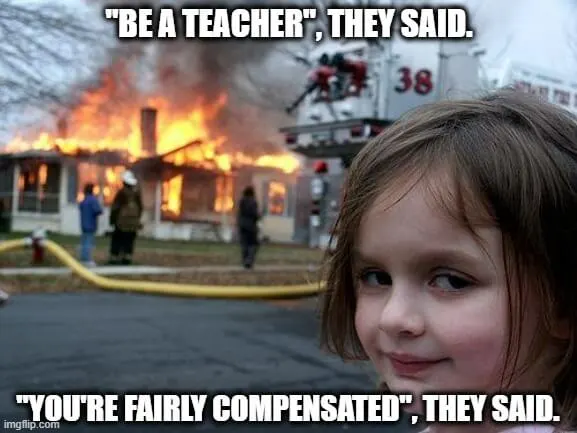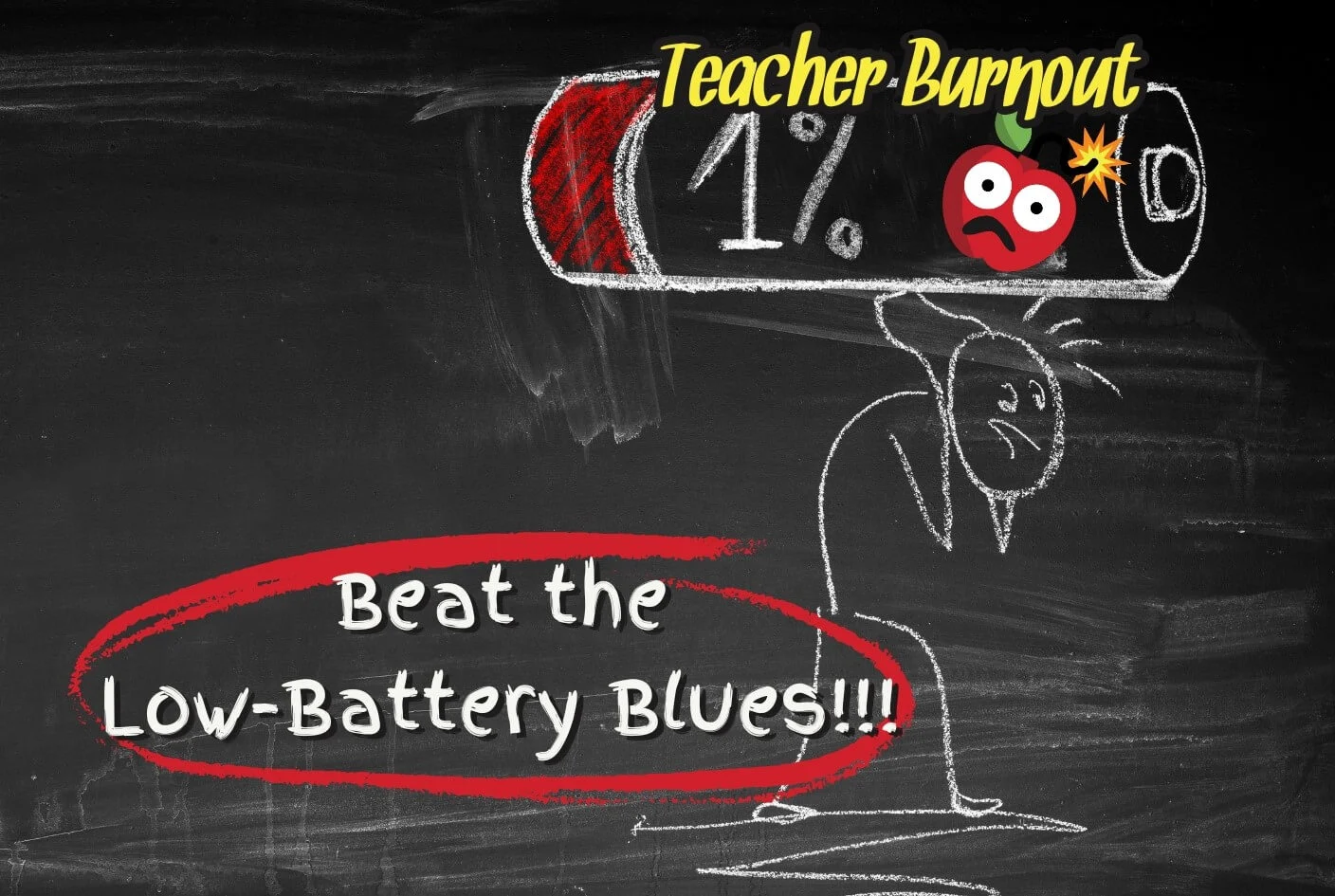Teacher burnout is REAL, and if you’re not careful, the symptoms are coming for YOU.
The World Health Organization classifies burnout as an “occupational phenomenon” – a legitimate occupational hazard that organizations need to address. While not classified as a medical condition, it can easily lead to serious health problems, both mental and physical.
Burnout is a syndrome that can happen in any job where there is chronic workplace stress going unmanaged. Burnout is characterized by its main symptoms:
- Chronic fatigue
- Mental and physical health issues
- Unusually high lack of interest or care about the job
- And an overall reduction in performance as a result
So that’s burnout, but teacher burnout is a whole other beast! Teaching is STRESSFUL – there are zero arguments there. And most teachers receive even less institutional support than basically any other profession out there.
So today, we’re exploring the symptoms of teacher burnout! You CAN prevent teacher burnout, in yourself and in your peers. And we’re going to discuss strategies to do just that.
Know the warning signs; know the self-care cures; know how to help yourself and others.
After all, the best medicine is prevention.

What is Teacher Burnout?
The signs of burnout for teachers are more complex because our jobs have so many different facets and we have a staggering amount of responsibilities. Yes, the effects of teacher burnout include feeling exhausted all the time but this is way more extreme than the usual exhaustion we are used to.
The physical and emotional exhaustion resulting from burnout makes it almost impossible to get the job done.
Another symptom common with teacher burnout that is more extreme for educators in the profession is just not caring anymore about “your why”. We are often told to remember our “why” by administrators or professional development specialists (who usually aren’t teachers themselves) when we are struggling to manage stress and fatigue.
Teachers tend to have more of a strong philosophy for why they keep showing up to a job that is so difficult and pays so poorly, or else we just wouldn’t do it anymore. This “why” is usually about caring for kids and wanting to make the next generation better than the one we grew up on.

Teacher burnout is taking the experience of regular occupational burnout and dialing that mess up to eleven. It’s a complete and utter loss of:
- Your physical health
- Your emotional wellbeing
- Your will to work (or live)
- Hoper for change and a better future
- And your why, both for teaching and in the broadest sense
When someone is burning out as a teacher, they no longer know or care why they are doing it. They just know that they have intense feelings of not being able to do it anymore. And in a job as stressful as teaching, if you don’t know or care why you’re there, the paycheck is not going to be enough to motivate you to continue.
This is when something has to change.
The Stages of Teacher Burnout
Soaring stress levels and no emotional support? You might just be experiencing teacher burnout!
As with any health issue, mental or physical, the symptoms of teacher burnout increase surely and steadily. The best way to avoid teacher burnout is to simply know the warning signs and catch it in the early stages.
Stage 1
You still want to teach. There is passion and commitment to the cause. But you’re observing waning job satisfaction and you’re likely feeling very overwhelmed.
Indicators of Stage 1 include:
- Low feelings of self-confidence (e.g. “I’m not good enough.”)
- Detrimental coping strategies (e.g. unhealthy habits)
- Growing disinterest in your hobbies or passions outside of work
Stage 2
Exhaustion is beginning to set in, but worse, cynicism is rearing its ugly head. The more you pour yourself into the job, the less return you see, and the impact on your work and personal life is becoming quickly apparent.
Indicators of Stage 2 include:
- Severe stress
- Quick to irritation (at work and home)
- Feeling like there’s “no time” in your personal life
- Feeling guilty about not doing more for your students
Stage 3
Cynicism has truly cemented and the physical and emotional exhaustion is becoming real. You’re over-extended at work with no end in sight and all you can see are the cracks and faultlines in the education industry. Feelings of questioning your choice of profession have likely turned into serious doubt you can even continue.
Indicators of Stage 3 include:
- Intense feelings of isolation
- Feelings of paranoia (e.g. that the district or school administrators are targeting you)
- A relentless feeling that you’ll never meet your goals
- Steadfast refusal to engage with professional development or voluntary work
Stage 4
You’re in survival mode. The burnout symptoms have seeped into all facets of your life like a disease. You are completely exhausted all the time and nervous breakdowns are a regular occurrence: you’re only options now are to recommit to the profession or consider leaving teaching mid-contract.
- Chronic fatigue and exhaustion, even during breaks
- Having more and more sick and mental health days
- Complete absence of hope for the future in both your work and personal life
- Frequent and persistent physical symptoms (e.g. colds, the flu, headaches, body pains, etc.)
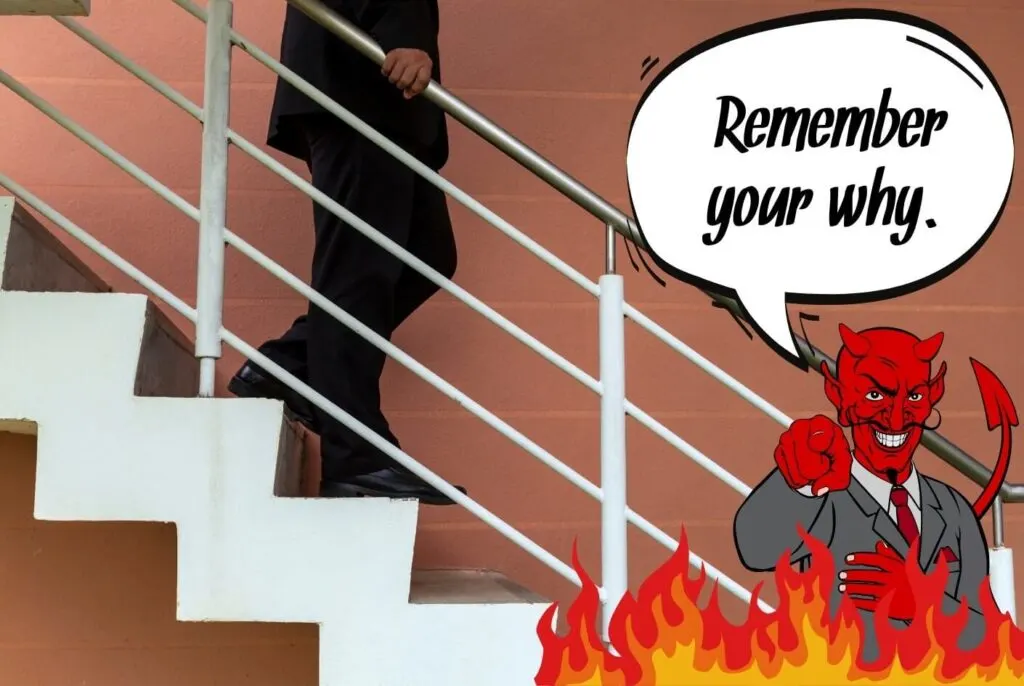
Quiz: Are You Burning Out as a Teacher?
Still questioning where you’re at? I’ve put a handy-dandy questionnaire together so you can figure it out!
Don’t let the toxic positivity of teaching turn you into a candle in the wind. Understand your needs and PRIORITIZE YOURSELF.
How often do you wake up already feeling exhausted and anxious about the day’s tasks?
- Never: 0 pts.
- Once or Twice a Week: 2 points
- A Few Times a Week: 2 points
- Every Day: 3 points
How often do you feel ineffective at your job? (We’re talking personal feelings, not something some awful colleague has told you.)
- Never: 0 pts.
- Once or Twice a Week: 2 points
- A Few Times a Week: 2 points
- Every Day: 3 points

How often do you feel you will never be able to keep up with the workload?
- Never: 0 pts.
- Once or Twice a Week: 2 points
- A Few Times a Week: 2 points
- Every Day: 3 points
How often do you feel like you don’t even care anymore if you do a good job at work?
- Never: 0 pts.
- Once or Twice a Week: 2 points
- A Few Times a Week: 2 points
- Every Day: 3 points
How often do you get excited or energized by something (anything) at work?
- Never: 0 pts.
- Once or Twice a Week: 2 points
- A Few Times a Week: 2 points
- Every Day: 3 points
Add one point for each of the following mental and physical health issues you can attribute solely to your job (include extra points for any condition not listed here):
- Anxiety
- High blood pressure
- Depression
- Suicidal ideation
- Feelings of worthlessness
- Paranoia
- Heart palpitations
- Stomach problems
- Digestion problems
- Significant weight gain/loss
Signs of Teacher Burnout Score
Now tally that mess up!
- 0-5: You’re probably not burned out, however, the fact that you are reading this article should be a red flag. You should start employing strategies to prevent and avoid teacher burnout.
- 6-10: You’re experiencing the symptoms in some capacity and should take a look at how to stop teacher burnout just to be safe.
- 11+: You have all the symptoms of teacher burnout and need to look into teacher burnout recovery strategies ASAP!
Get the Books That Started It All
Before the blog, the podcast, the merch store… there were the best-selling books.
If you like the content on this site, then you’ll LOVE the Teacher Misery books. They’re jam-packed with teaching insanity, ridiculous true stories, and all the commiseration about the profession you’ve come to know, adore, and respect.
Follow the links below to get your copies today!
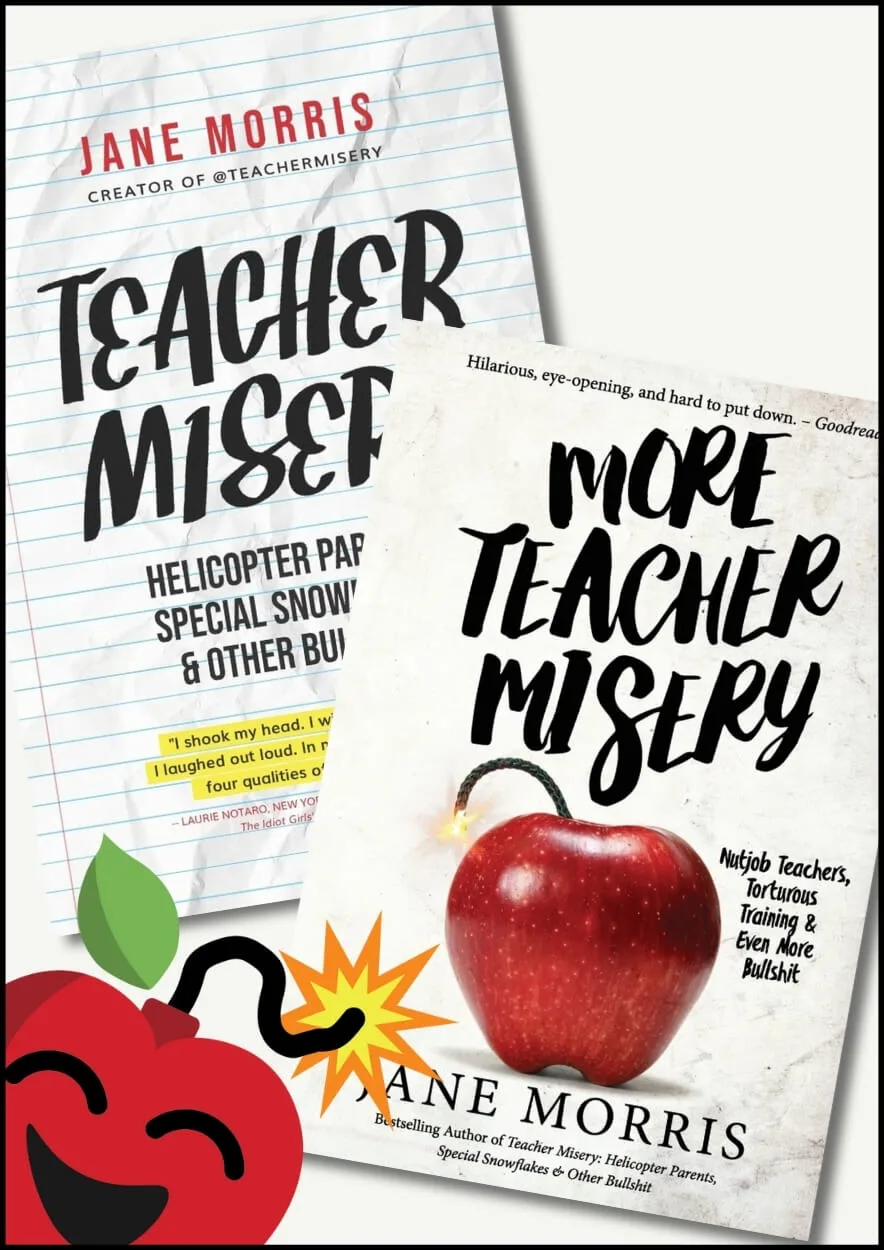
The 7 Signs of Teacher Burnout: Symptoms to AVOID
So we’ve looked at what causes teacher burnout and provided you a handy rubric (hah!) to get right into the nitty gritties.
So now, let’s take a look at those teacher burnout symptoms more closely so you can, ideally, improve your job satisfaction.
1. Exhaustion
The word “exhausted” gets thrown around quite a bit. But when we’re talking about the symptoms of teacher burnout, this is much more serious than being really tired after a long week. This is the kind of tiredness that doesn’t go away, even when you have somehow had a proper rest period and have taken good care of yourself.
Interestingly, the dictionary defines exhaustion as “the state of using something up or of being used up completely”. This feels very similar to the feeling of burning out as a teacher. You are a “candle” who has burned down to nothing, until there is nothing left to give.
If you still aren’t sure if you are experiencing this symptom of teacher burnout, ask yourself if you would describe yourself as any of the following on a regular basis: overtired, weary, lethargic, depleted, drained.
Nobody knows tired like a teacher knows tired.

2. Anxiety
“Anxiety” is another word that gets floated a lot in different spaces. However, it’s actually a serious mental health condition, not just being worried about the future.
Acute anxiety involves a constant and intense worry about all kinds of things. Even mundane, everyday situations.
As far as the signs of teacher burnout go, this would mean a persistent and extreme feeling of worry about work, especially when outside the workplace. If you still aren’t sure if you are experiencing this stage of burnout, ask yourself if you would describe yourself as having any of the following symptoms of an anxiety disorder on a regular basis:
- Dread
- Intense fear
- Obsessive thoughts
- Panic (or panic attacks)
- Heart palpitations
- Shortness of breath
- Uncontrollable restlessness
- Concentration issues
3. Hopelessness
This is a very serious symptom common for teachers experiencing burnout. It’s important to distinguish hopelessness about work from hopelessness about life in general.
If you feel like what you are doing at work is not making a difference with the students and/or the work only gets more torturous, this could be described as hopelessness about teaching.
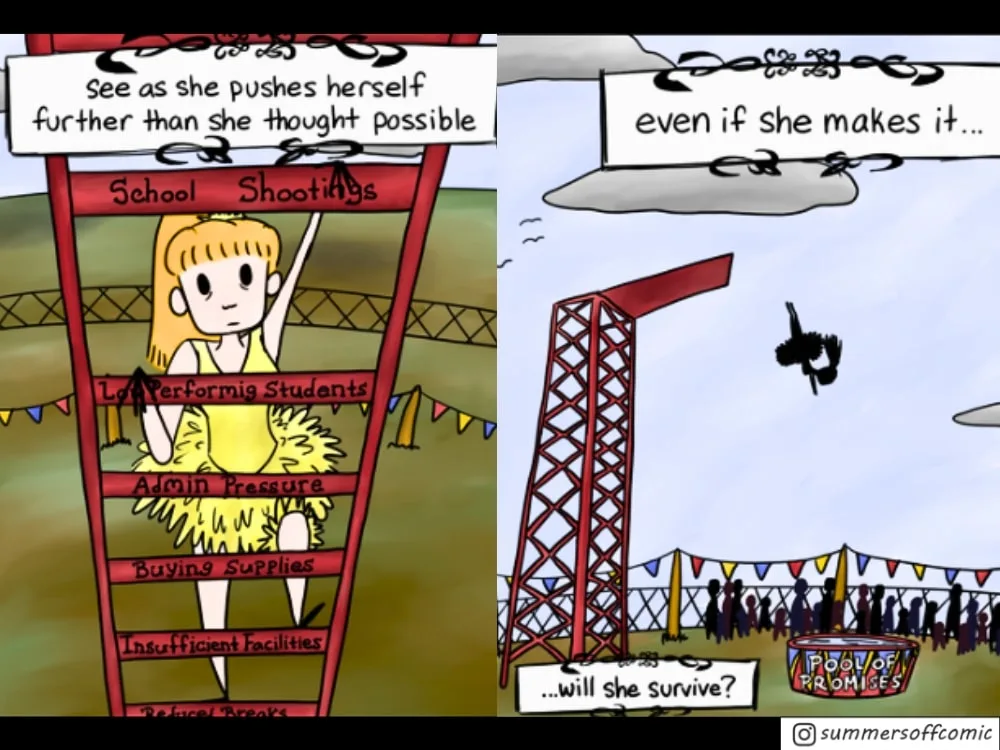
If you feel hopeless about life, like there is no point in living or your life has no value, this is very serious. Seek professional help immediately – there is ZERO shame in receiving professional emotional support.
If you don’t know how hopeless you feel about work, check in with yourself.
Do you feel like you’re making an impact in your students’ lives? Do you expect your job to keep getting worse? Can you see the potential for improvement?
These are the questions us teachers need to ask ourselves and never stop asking.
4. Cynicism
Cynicism is similar to feelings of hopelessness but with more anger, pain, resentment, and snarkiness layered above and below.
Have you become the Debbie Downer at the lunch table when that wasn’t your usual state of being? Are you no longer making sarcastic jokes or venting but complaining with genuine anger a majority of the time?
I am kind of this person on a regular basis, but the difference for me as my teacher burnout got worse was that I was bringing these feelings into the classroom. For 13 years, I kept my complaining to the lounge and other adults, but in later years, I was sharing these feelings with my students.
For me, this turned into a coping mechanism that was spiraling out of control. No matter how awful student behavior is, we can’t share with them how much they are making us want to bang our heads into a brick wall or start having breakdowns in class. It’s a cardinal rule of teaching
If you’re finding yourself sharing these negative feelings with students a lot, this is a HUGE sign of teacher burnout.
5. Constant Feelings of Confusion
This was a big one for me. For my first ten years of teaching, I barely needed to write anything down. Lessons and locations of materials were all in my brain and easy for me to access when needed.
But as the job got more stressful and I started to burn out, I couldn’t remember a lot of things. No amount of notes and reminders helped me to feel any more in control.
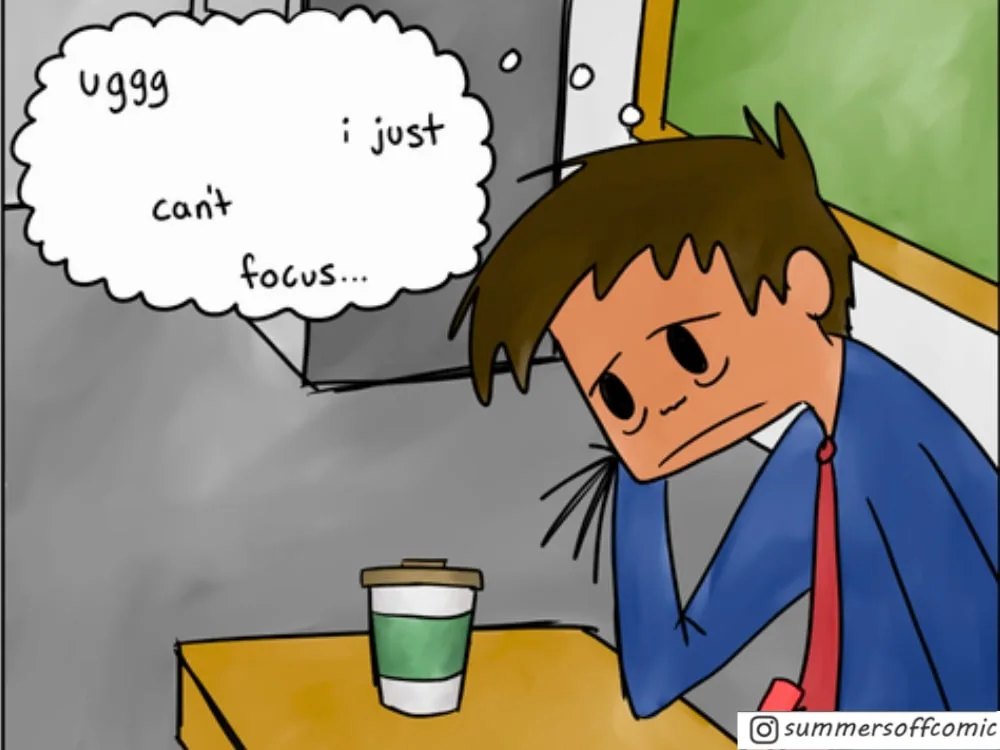
As expectations increased, so did feelings of confusion. It wasn’t until I left teaching and handled so many other responsibilities in life smoothly that I realized my brain wasn’t the problem; teaching was. Ask yourself how often at work you feel:
- Confused
- Forgetful
- Unfocused
- Unsure
- Indecisive
- Perpetual brain fog
6. Overwhelming Physical Health Problems
If you also have several physical health problems that you don’t have in the summer (or just aren’t nearly as bad), this is a major red flag that you need to recover from teacher burnout STAT. You do not have to live your life in pain, especially when there is one thing causing the pain that you can walk away from.
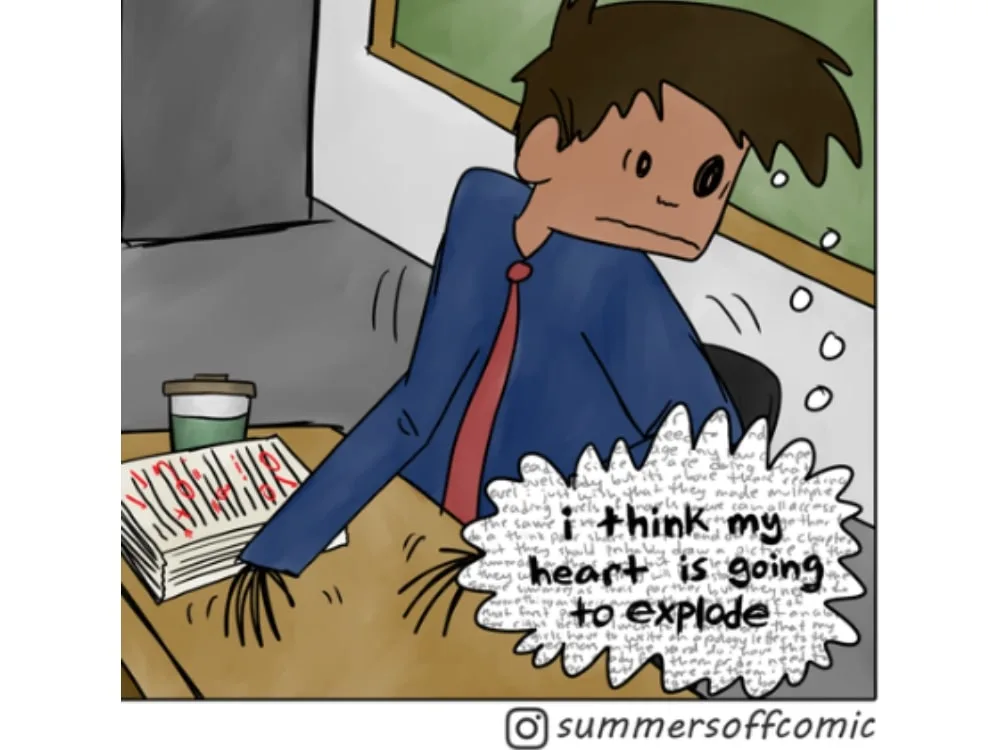
Health problems caused by burnout to be vigilant against include:
- High blood pressure
- Heart palpitations
- Stress rashes
- Stomach problems,
- Digestion issues
- Significant weight gain/loss
7. Overwhelming Mental Health Problems
Many adults struggle with depression, anxiety, trauma, and other persistent disorders. But if you are experiencing more of these than usual and they are more chronic and acute in nature, that is a big effect of teacher burnout.
Studies have found that teachers exhibit significantly higher rates of burnout and depressive symptoms than the general population.
This number has increased significantly in the last ten years too. If you are on multiple medications for anxiety or depression to help you get through the school year (and you don’t seem to need them during the summer), that is a MAJOR warning sign of teacher burnout.
Buy Some Merch · Support the Site!
Teacher Misery is by the teachers and for the teachers. Our mission to improve the lives of teachers everywhere.
If you’d like to support the cause, buy yourself (or the burnt-out educator in your life) a gift from our merch store. And, YES, they are all as sarcastic as you’d hope. 😉
Every dollar supports the commiseration!

How to Avoid Teacher Burnout
Look, I’ll come right out of the gate and tell you to just consider quitting. If we’re talking “whys”, there are a lot of whys to why you should quit teaching, but burnout is smack-bang at the top of the list!
So many teachers fear quitting, whether it’s for the kids or for what may or may not lie in wait for them on the other side. But I promise you: quitting is 100% possible and there’s a damn good chance it will only improve your quality of life.
That was my experience anyway.
Don’t take my word for it though! Listen to Daphne Gomez, The Teacher Career Coach.
She’s built a whole career post-teaching focused on helping other teachers do the same. She’s got a whole step-by-step course dedicated to doing just that.
In her course, you’ll receive all kinds of support. And a whole collection of awesome resources and assistance for kicking off your next season in life with 100% success!
Get help with:
- Determining what other jobs are right for you
- Networking
- Resume writing
- Interview coaching
- And even access to a community of current and former teachers for encouragement and support
You could strive to improve job satisfaction. But alternatively, you could just strive for a better job!
If you’re even contemplating leaving teaching, there’s no one you need in your corner more than the Teacher Career Coach Course. At the very least, check out the content on her site and see what you think. But really, maybe you should just…
Self-Care Coping Strategies for Teacher Burnout
Okkkkk, so maybe you’re not quite at the point of quitting yet. So instead, how can you reduce stress? How can you redefine a toxic work environment and enrich your work-life balance?
As I said, prevention is the best medicine. Here’s how to survive teacher burnout:
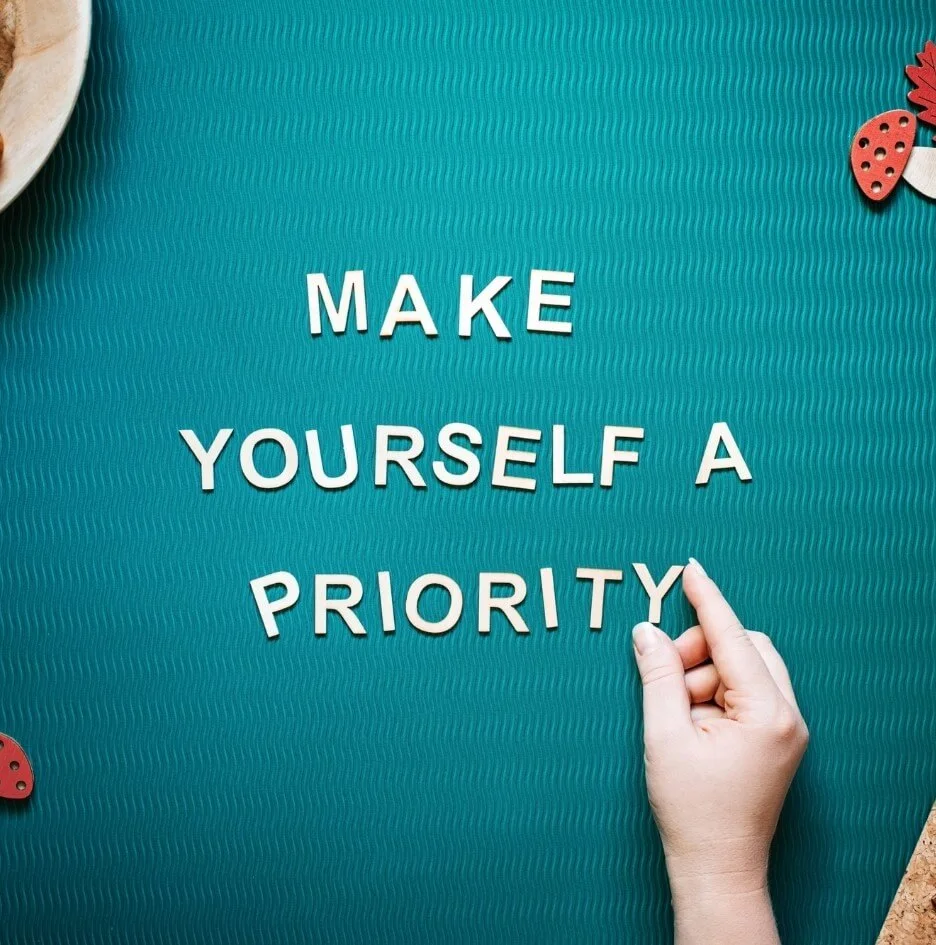
- JUST SAY NO! They are always going to try to suck you into doing as many unpaid extra duties as they can. Unless they specifically tell you that you have to do something, JUST OPT OUT. Make “No” your new life philosophy.
I actually knew a group of teachers who got the word “NO” tattooed on their wrists as a constant reminder to put themselves first and not give in to being overworked and, well, burnt out! - Refuse to think about work or check your email when not at work. You’re not a doctor and should not be expected to be on-call! You certainly don’t get paid like one. Wait until Sunday night when you’re anxious anyway, or get to school extra early on Mondays to weed through the emails
- Schedule time in your calendar for something you love (even if you have to lie). What relaxes you? For me, it’s being cozy in bed with my dogs and a good novel.
If you can’t find the time to do the things that relax you… Well, as my students would say, “You doin’ too much!” Even if you have to lie and say you have a doctor’s appointment when really you’re going for a hike, do it. It’s not really a lie because it is for your mental and physical health (teehee). - Put up a wall, also known as try not to take it personally. Good Lord is this hard for me! I wear my heart on my sleeve and take everything personally. But I’ve gotten better at erecting a mental wall that refuses to let anyone affect me who doesn’t truly know me.
A parent is cursing me out? Thou shall not pass my mental wall, crazy person! - Master the art of quiet quitting. Quiet quitting isn’t actually quitting: it’s just purely 100% sticking to your contracted scope of duties and work requirements and not a lick more. We didn’t create a transactional labor market – they did. So now use that mess to your advantage!
Recovering from the Symptoms of Teacher Burnout
There is hope! Recovering from teacher burnout is possible!
However… Does that mean you can’t go back to teaching? Maybe.
A teacher can recover from burnout, and the easiest way to do so is to stop teaching for a long time. How long? I would say you need to stay away from any school for at least one year.
The other recovery strategies for burnout and teaching-induced prolonged stress involve copious amounts of essential self-care. Get back to the basics:
- Eat a healthy diet.
- Get a lot of rest.
- Drink more water.
- Stop talking about and thinking about school.
- Make time for the people and things you love.
- Bask in the sun.
- Start a gratitude journal.
- And maybe get some counseling.
For me, I left in a volatile way due to the ongoing trauma of teaching and issues that were not being resolved, and it took at least six months until I felt like myself again. I had low self-esteem regarding what I was capable of and just felt like a sad, broken-down mess. But the farther away I got from the situation and the more validation I received from my peers, the stronger I became.
If you are going to stay in teaching for whatever reason, take as long of a break as possible. Think of it like an actual break-up! Only time and breaking off contact will heal those wounds.
And after those wounds have healed, consider switching schools, grade levels, districts, whatever. Just make sure you put up that wall and make a hearty “NO” your new best friend.
You are not a candle with a cute inspirational quote on it. You are a human being. So if you must continue teaching, then carry on my friend. But no matter, refuse to burn down!
Or if you do, just take ’em all with you. ;)
